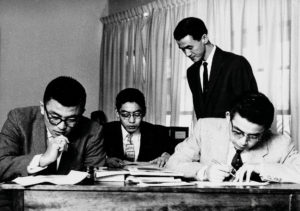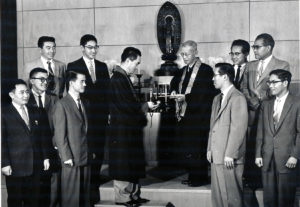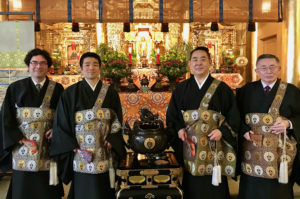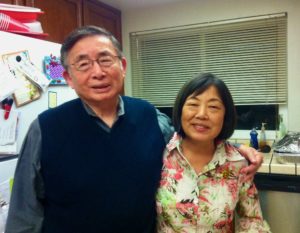Former Bishop Rev. Dr. Seigen Haruo Yamaoka had never planned on his amazing path — which has now nearly spanned 60 years — with the Buddhist Churches of America.
He wanted to become a journalist, a newspaper reporter.
But he graduated in 1956 with a bachelor’s degree in journalism from Fresno State University, a time when Japanese Americans were continuing to experience the brunt of racist backlash in America. Just a decade before, during World War II, 120,000 individuals of Japanese ancestry had been uprooted from their homes and sent to mass detention camps. And mainstream newspaper staffs remained exclusively white and male, off limits to minorities.

Rev. Dr. Seigen Yamaoka, right, is shown taking a Japanese language class in 1956 with the Buddhist Study Center with, from left, Rev. Dr. William Masuda, Rev. Dr. Leslie Kawamura and Mr. Matsuo
“I had journalism professors tell me that I wouldn’t be able to get a job out of college,” he said in a recent interview. “At that time, it was pretty hard to be hired as a Japanese American. I got a summer (newspaper) program, and worked on some weekly newspapers, but as far as a good position anywhere, it was difficult.”
His dreams of becoming a journalist were dashed. But whatever he might have accomplished as a journalist would have likely paled compared to his long list of accomplishments with the BCA and IBS.
Rev. Dr. Yamaoka, who began his career in 1964, is set to retire in June as IBS Vice President of Development and as IBS part-time faculty member. His fundraising leadership and expertise have been key to sustaining the BCA and IBS. Millions of dollars in donations have been raised during his pivotal role in the past 30 years.
“I’m going to be 87 in August, so I figured it’s about time to kind of step aside,” he said.
Praised for IBS Role
Both IBS President Rev. Dr. David Matsumoto and IBS Dean of Students Dr. Scott Mitchell praised Rev. Dr. Yamaoka’s pivotal role with the IBS.
“Although many people have made important contributions to IBS over the years, IBS as we know it would not exist without Rev. Dr. Seigen Yamaoka,” said Rev. Dr. Matsumoto. “When he was the Bishop of BCA, Rev. Yamaoka’s dream was that IBS would someday gain accreditation, become a GTU (Graduate Theological Union) member school and have a solid financial foundation. Now, 40 years later, his aspirations and tireless efforts have enabled IBS to accomplish those goals.”
Dr. Mitchell said: “None of us would be here if it wasn’t for Rev. Yamaoka. His leadership and vision for Shin Buddhism in the United States made possible everything that we’ve been able to accomplish the last few years at IBS.”

Rev. Dr. Seigen Yamaoka is shown with other Buddhist Study Center members in the 1950s. In front, from left, are: Rev Keisho Motoyama, Rev. Dr. William Masuda, Mr. Matsuo, Mr. Noboru Hanyu, and Rev. Hakushi Futaba. In back, from left, are: Rev. Dr. Yamaoka, Rev. Dr. Leslie Kawamura, Rev. Kanmo Imamura, Bishop Rev. Enryo Shigefuji, Rev. Dr. Taitetsu Unno, and Mr. Albert Kosakura. Not shown is member Rev. John Doami. (Courtesy of Berkeley Buddhist Temple)
Rev. Dr. Yamaoka was the central figure behind the formation of the Campaign for Buddhism in America in February 1982 — the BCA’s first comprehensive fundraising drive and precursor to the Endowment Foundation.
The campaign set a goal of raising $15 million in five years — and ended up with about $10 million in donations by 1993, later administered by the BCA Endowment Foundation Board of Trustees.
In addition, Rev. Dr. Yamaoka served as BCA Bishop — and concurrently as IBS President — for three, five-year terms from 1981 to 1996.
Aspired to Be a Journalist
But as a youth who grew up in West Fresno, he loved writing and sports. He was a student reporter and editor at Central Union High School, Fresno Junior College (now Fresno City College) and the sports editor at Fresno State University, which was then known as Fresno State College.
But after failing to land a good mainstream newspaper job, he decided to immerse himself in the Nembutsu teachings. The BCA sent him to Ryukoku University in Kyoto to become a minister in 1958.
He came back to the United States in 1964, and was assigned first to the Buddhist Church of Oakland and then to the Buddhist Church of Stockton. He would return to Oakland, where he retired in 2008 after 44 years as a Kaikyoshi minister.
Rev. Dr. Yamaoka began learning how to run major fundraising campaigns as Bishop. He was tasked with formalizing an endowment foundation and creating a BCA fundraising campaign.
In the early 1980s, the BCA had an Endowment Committee of volunteers, but it wasn’t a professional fundraising group. The BCA had a total endowment of about $250,000 — and relied largely on assessments of members.
“I felt that there was a big, major problem because we were always going on assessments,” he said. “This was not a situation where the future would be sustainable.”
However, he realized that he didn’t have a background in fundraising. “I was at a total loss and didn’t know what to do,” he said.
Rev. Dr. Numata Advised
He sought out Rev. Dr. Yehan Numata, who founded Bukkyo Dendo Kyokai (BDK), the Society for the Promotion of Buddhism. Rev. Dr. Numata had served as a Hongwanji minister in Hawaii and graduated from UC Berkleley and was a member of the Berkeley Buddhist Temple. In 1934, Rev. Dr. Numata founded Mitutoyo Corp., the Japanese multinational corporation.
Rev. Dr. Numata gave the following advice: study the entire BCA organization; select three areas to prioritize; form a committee to achieve those goals; and ask for the support from the BCA.

Rev. Dr. Yamaoka poses at the Hoonko Service at the Buddhist Church of Oakland in 2020. From left are Rev. Harry Bridge, Rev. Kiyonobu Kuwahara and Rev. Michael Endo. (Courtesy of Isago Isao Tanaka and Mika Bridge)
Rev. Dr. Yamaoka concluded that there was “no long-term planning” and chose to focus on three areas — financial stability and sustainability of BCA; Buddhist education and IBS; and ministerial concerns.
He would later use his fundraising expertise for the Buddhist Church of Oakland’s centennial in 2001. Working with BCO President Rev. Michael Endo, the church was able to refurbish the Onaijin, redo the social hall flooring, paint the temple and put in new carpet. In 2002, the elevator was installed.
In addition, Rev. Dr. Yamaoka also got involved with Campaign BCA — The 21st Century. That campaign was key to the formation of the Jodo Shinshu Center in Berkeley.
“Rev. Yamaoka was instrumental in raising the $19.5 million for Campaign BCA — The 21st Century from 2003-2011,” said Robert Noguchi, director of Campaign BCA — The 21st Century. “With the many relationships he had formed throughout his career, his extensive experience in fundraising — in particular, leading the Campaign for Buddhism — he was a great mentor to me. I’m grateful for his guidance, friendship and support.”
Rev. Dr. Yamaoka was succeeded by Rev. Harry Bridge at BCO. “I was very fortunate to do an ‘internship’ under Rev. Yamaoka at Buddhist Church of Oakland, when I was a student at Institute of Buddhist Studies — it must have been around 1999-2000,” Rev. Bridge said. “I learned so much!”
Rev. Bridge added: “His commitment to the education of ministers continues to this day — I know that I certainly benefited from it. He wanted us to explore the Dharma through our own life experiences, so that we could help others even if their experiences were different.”
Looking forward, Rev. Dr. Yamaoka voiced strong support of the BCA’s new comprehensive campaign, Dharma Forward. “You have to continually raise funds,” he said. “So the Dharma Forward campaign is very, very crucial to sustain the BCA and IBS.”
This article was republished from the June 2021 Wheel of Dharma.

